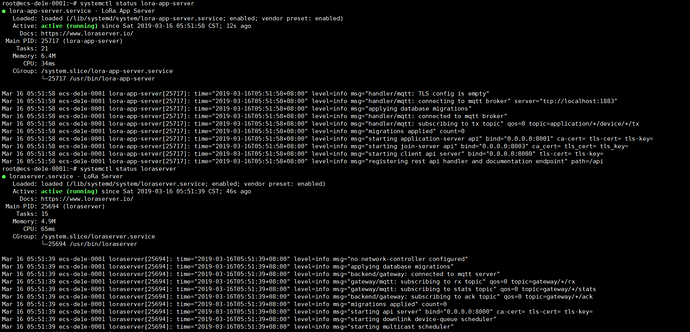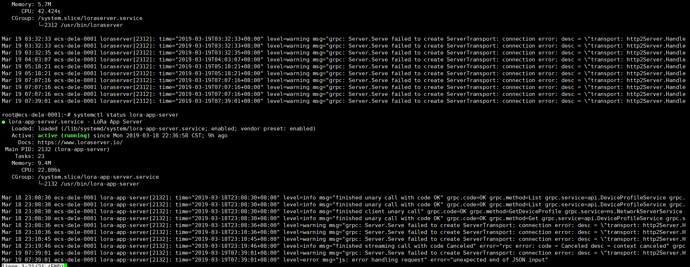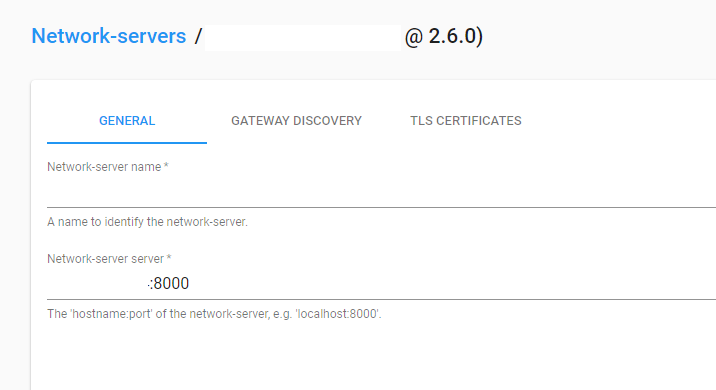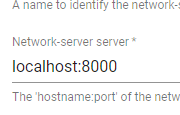When I click “Live Lorawan Frame”, i got am error massage say “not connected to websocket”. Below is logs:
root@ecs-de1e-0001:~# journalctl -u lora-app-server -f -n 50
-- Logs begin at Sun 2018-12-23 09:15:01 CST. --
Mar 16 06:04:09 ecs-de1e-0001 lora-app-server[25717]: time="2019-03-16T06:04:09+08:00" level=warning msg="grpc: Server.Serve failed to create ServerTransport: connection error: desc = "transport: http2Server.HandleStreams received bogus greeting from client: \"GET / HTTP/1.1\\r\\nHost: 11\"""
Mar 16 06:04:37 ecs-de1e-0001 lora-app-server[25717]: time="2019-03-16T06:04:37+08:00" level=warning msg="grpc: Server.Serve failed to create ServerTransport: connection error: desc = "transport: http2Server.HandleStreams failed to receive the preface from client: EOF""
Mar 16 06:04:37 ecs-de1e-0001 lora-app-server[25717]: time="2019-03-16T06:04:37+08:00" level=warning msg="grpc: Server.Serve failed to create ServerTransport: connection error: desc = "transport: http2Server.HandleStreams received bogus greeting from client: \"GET / HTTP/1.1\\r\\nHost: 11\"""
Mar 16 06:04:40 ecs-de1e-0001 lora-app-server[25717]: time="2019-03-16T06:04:40+08:00" level=warning msg="grpc: Server.Serve failed to create ServerTransport: connection error: desc = "transport: http2Server.HandleStreams received bogus greeting from client: \"GET / HTTP/1.1\\r\\nHost: 11\"""
Mar 16 06:04:41 ecs-de1e-0001 lora-app-server[25717]: time="2019-03-16T06:04:41+08:00" level=warning msg="grpc: Server.Serve failed to create ServerTransport: connection error: desc = "transport: http2Server.HandleStreams received bogus greeting from client: \"GET / HTTP/1.1\\r\\nHost: 11\"""
Mar 16 06:04:42 ecs-de1e-0001 lora-app-server[25717]: time="2019-03-16T06:04:42+08:00" level=warning msg="grpc: Server.Serve failed to create ServerTransport: connection error: desc = "transport: http2Server.HandleStreams received bogus greeting from client: \"GET / HTTP/1.1\\r\\nHost: 11\"""
Mar 16 06:04:42 ecs-de1e-0001 lora-app-server[25717]: time="2019-03-16T06:04:42+08:00" level=warning msg="grpc: Server.Serve failed to create ServerTransport: connection error: desc = "transport: http2Server.HandleStreams received bogus greeting from client: \"GET / HTTP/1.1\\r\\nHost: 11\"""
Mar 16 06:04:42 ecs-de1e-0001 lora-app-server[25717]: time="2019-03-16T06:04:42+08:00" level=warning msg="grpc: Server.Serve failed to create ServerTransport: connection error: desc = "transport: http2Server.HandleStreams received bogus greeting from client: \"GET / HTTP/1.1\\r\\nHost: 11\"""
Mar 16 06:04:42 ecs-de1e-0001 lora-app-server[25717]: time="2019-03-16T06:04:42+08:00" level=warning msg="grpc: Server.Serve failed to create ServerTransport: connection error: desc = "transport: http2Server.HandleStreams received bogus greeting from client: \"GET / HTTP/1.1\\r\\nHost: 11\"""
Mar 16 06:04:43 ecs-de1e-0001 lora-app-server[25717]: time="2019-03-16T06:04:43+08:00" level=warning msg="grpc: Server.Serve failed to create ServerTransport: connection error: desc = "transport: http2Server.HandleStreams received bogus greeting from client: \"GET / HTTP/1.1\\r\\nHost: 11\"""
Mar 16 06:04:43 ecs-de1e-0001 lora-app-server[25717]: time="2019-03-16T06:04:43+08:00" level=warning msg="grpc: Server.Serve failed to create ServerTransport: connection error: desc = "transport: http2Server.HandleStreams received bogus greeting from client: \"GET / HTTP/1.1\\r\\nHost: 11\"""
Mar 16 06:05:04 ecs-de1e-0001 lora-app-server[25717]: time="2019-03-16T06:05:04+08:00" level=warning msg="grpc: Server.Serve failed to create ServerTransport: connection error: desc = "transport: http2Server.HandleStreams failed to receive the preface from client: EOF""
Mar 16 06:05:44 ecs-de1e-0001 lora-app-server[25717]: time="2019-03-16T06:05:44+08:00" level=warning msg="grpc: Server.Serve failed to create ServerTransport: connection error: desc = "transport: http2Server.HandleStreams received bogus greeting from client: \"GET / HTTP/1.1\\r\\nHost: 11\"""
Mar 16 06:05:55 ecs-de1e-0001 lora-app-server[25717]: time="2019-03-16T06:05:55+08:00" level=warning msg="grpc: Server.Serve failed to create ServerTransport: connection error: desc = "transport: http2Server.HandleStreams failed to receive the preface from client: EOF""
Mar 16 06:05:55 ecs-de1e-0001 lora-app-server[25717]: time="2019-03-16T06:05:55+08:00" level=warning msg="grpc: Server.Serve failed to create ServerTransport: connection error: desc = "transport: http2Server.HandleStreams failed to receive the preface from client: EOF""
Mar 16 06:09:31 ecs-de1e-0001 lora-app-server[25717]: time="2019-03-16T06:09:31+08:00" level=info msg="finished streaming call with code Canceled" error="rpc error: code = Canceled desc = context canceled" grpc.code=Canceled grpc.method=StreamFrameLogs grpc.service=api.GatewayService grpc.start_time="2019-03-16T06:02:13+08:00" grpc.time_ms=438314.66 peer.address="[::1]:57206" span.kind=server system=grpc
Mar 16 06:09:32 ecs-de1e-0001 lora-app-server[25717]: time="2019-03-16T06:09:32+08:00" level=info msg="finished unary call with code OK" grpc.code=OK grpc.method=List grpc.service=api.ApplicationService grpc.start_time="2019-03-16T06:09:32+08:00" grpc.time_ms=3.5 peer.address="[::1]:57190" span.kind=server system=grpc
Mar 16 06:09:37 ecs-de1e-0001 lora-app-server[25717]: time="2019-03-16T06:09:37+08:00" level=info msg="finished unary call with code OK" grpc.code=OK grpc.method=Get grpc.service=api.ApplicationService grpc.start_time="2019-03-16T06:09:37+08:00" grpc.time_ms=2.377 peer.address="[::1]:57190" span.kind=server system=grpc
Mar 16 06:09:37 ecs-de1e-0001 lora-app-server[25717]: time="2019-03-16T06:09:37+08:00" level=info msg="finished unary call with code OK" grpc.code=OK grpc.method=List grpc.service=api.DeviceService grpc.start_time="2019-03-16T06:09:37+08:00" grpc.time_ms=4.68 peer.address="[::1]:57196" span.kind=server system=grpc
Mar 16 06:09:43 ecs-de1e-0001 lora-app-server[25717]: time="2019-03-16T06:09:43+08:00" level=info msg="finished unary call with code OK" grpc.code=OK grpc.method=Get grpc.service=api.ApplicationService grpc.start_time="2019-03-16T06:09:43+08:00" grpc.time_ms=2.349 peer.address="[::1]:57190" span.kind=server system=grpc
Mar 16 06:09:44 ecs-de1e-0001 lora-app-server[25717]: time="2019-03-16T06:09:44+08:00" level=info msg="finished client unary call" grpc.code=OK grpc.method=GetDevice grpc.service=ns.NetworkServerService grpc.time_ms=0.772 span.kind=client system=grpc
Mar 16 06:09:44 ecs-de1e-0001 lora-app-server[25717]: time="2019-03-16T06:09:44+08:00" level=info msg="finished unary call with code OK" grpc.code=OK grpc.method=Get grpc.service=api.DeviceService grpc.start_time="2019-03-16T06:09:44+08:00" grpc.time_ms=3.694 peer.address="[::1]:57196" span.kind=server system=grpc
Mar 16 06:09:44 ecs-de1e-0001 lora-app-server[25717]: time="2019-03-16T06:09:44+08:00" level=info msg="finished client unary call" grpc.code=OK grpc.method=GetDeviceProfile grpc.service=ns.NetworkServerService grpc.time_ms=0.964 span.kind=client system=grpc
Mar 16 06:09:44 ecs-de1e-0001 lora-app-server[25717]: time="2019-03-16T06:09:44+08:00" level=info msg="finished unary call with code OK" grpc.code=OK grpc.method=Get grpc.service=api.DeviceProfileService grpc.start_time="2019-03-16T06:09:44+08:00" grpc.time_ms=3.525 peer.address="[::1]:57212" span.kind=server system=grpc
Mar 16 06:09:44 ecs-de1e-0001 lora-app-server[25717]: time="2019-03-16T06:09:44+08:00" level=info msg="finished unary call with code OK" grpc.code=OK grpc.method=List grpc.service=api.DeviceProfileService grpc.start_time="2019-03-16T06:09:44+08:00" grpc.time_ms=4.089 peer.address="[::1]:57212" span.kind=server system=grpc
Mar 16 06:09:45 ecs-de1e-0001 lora-app-server[25717]: time="2019-03-16T06:09:45+08:00" level=info msg="finished unary call with code OK" grpc.code=OK grpc.method=List grpc.service=api.DeviceProfileService grpc.start_time="2019-03-16T06:09:45+08:00" grpc.time_ms=3.95 peer.address="[::1]:57212" span.kind=server system=grpc
Mar 16 06:09:45 ecs-de1e-0001 lora-app-server[25717]: time="2019-03-16T06:09:45+08:00" level=info msg="finished client unary call" grpc.code=OK grpc.method=GetDeviceProfile grpc.service=ns.NetworkServerService grpc.time_ms=0.803 span.kind=client system=grpc
Mar 16 06:09:45 ecs-de1e-0001 lora-app-server[25717]: time="2019-03-16T06:09:45+08:00" level=info msg="finished unary call with code OK" grpc.code=OK grpc.method=Get grpc.service=api.DeviceProfileService grpc.start_time="2019-03-16T06:09:45+08:00" grpc.time_ms=3.375 peer.address="[::1]:57212" span.kind=server system=grpc
Mar 16 06:09:50 ecs-de1e-0001 lora-app-server[25717]: time="2019-03-16T06:09:50+08:00" level=info msg="finished client streaming call" grpc.code=OK grpc.method=StreamFrameLogsForDevice grpc.service=ns.NetworkServerService grpc.time_ms=0.024 span.kind=client system=grpc
Mar 16 06:09:53 ecs-de1e-0001 lora-app-server[25717]: time="2019-03-16T06:09:53+08:00" level=info msg="finished streaming call with code Canceled" error="rpc error: code = Canceled desc = context canceled" grpc.code=Canceled grpc.method=StreamFrameLogs grpc.service=api.DeviceService grpc.start_time="2019-03-16T06:09:50+08:00" grpc.time_ms=3564.991 peer.address="[::1]:57196" span.kind=server system=grpc
Mar 16 06:09:59 ecs-de1e-0001 lora-app-server[25717]: time="2019-03-16T06:09:59+08:00" level=info msg="finished streaming call with code OK" grpc.code=OK grpc.method=StreamEventLogs grpc.service=api.DeviceService grpc.start_time="2019-03-16T06:09:53+08:00" grpc.time_ms=5364.512 peer.address="[::1]:57196" span.kind=server system=grpc
Mar 16 06:09:59 ecs-de1e-0001 lora-app-server[25717]: time="2019-03-16T06:09:59+08:00" level=info msg="finished client streaming call" grpc.code=OK grpc.method=StreamFrameLogsForDevice grpc.service=ns.NetworkServerService grpc.time_ms=0.021 span.kind=client system=grpc
Mar 16 06:10:01 ecs-de1e-0001 lora-app-server[25717]: time="2019-03-16T06:10:01+08:00" level=info msg="finished streaming call with code Canceled" error="rpc error: code = Canceled desc = context canceled" grpc.code=Canceled grpc.method=StreamFrameLogs grpc.service=api.DeviceService grpc.start_time="2019-03-16T06:09:59+08:00" grpc.time_ms=1589.056 peer.address="[::1]:57196" span.kind=server system=grpc
Mar 16 06:10:02 ecs-de1e-0001 lora-app-server[25717]: time="2019-03-16T06:10:02+08:00" level=info msg="finished streaming call with code OK" grpc.code=OK grpc.method=StreamEventLogs grpc.service=api.DeviceService grpc.start_time="2019-03-16T06:10:01+08:00" grpc.time_ms=1342.11 peer.address="[::1]:57196" span.kind=server system=grpc
Mar 16 06:10:03 ecs-de1e-0001 lora-app-server[25717]: time="2019-03-16T06:10:03+08:00" level=info msg="finished client streaming call" grpc.code=OK grpc.method=StreamFrameLogsForDevice grpc.service=ns.NetworkServerService grpc.time_ms=0.026 span.kind=client system=grpc
Mar 16 06:10:04 ecs-de1e-0001 lora-app-server[25717]: time="2019-03-16T06:10:04+08:00" level=info msg="finished streaming call with code Canceled" error="rpc error: code = Canceled desc = context canceled" grpc.code=Canceled grpc.method=StreamFrameLogs grpc.service=api.DeviceService grpc.start_time="2019-03-16T06:10:03+08:00" grpc.time_ms=1209.11 peer.address="[::1]:57196" span.kind=server system=grpc
Mar 16 06:21:17 ecs-de1e-0001 lora-app-server[25717]: time="2019-03-16T06:21:17+08:00" level=info msg="finished streaming call with code OK" grpc.code=OK grpc.method=StreamEventLogs grpc.service=api.DeviceService grpc.start_time="2019-03-16T06:10:04+08:00" grpc.time_ms=672841.56 peer.address="[::1]:57196" span.kind=server system=grpc
Mar 16 06:21:17 ecs-de1e-0001 lora-app-server[25717]: time="2019-03-16T06:21:17+08:00" level=info msg="finished unary call with code OK" grpc.code=OK grpc.method=List grpc.service=api.GatewayService grpc.start_time="2019-03-16T06:21:17+08:00" grpc.time_ms=2.801 peer.address="[::1]:57206" span.kind=server system=grpc
Mar 16 06:21:18 ecs-de1e-0001 lora-app-server[25717]: time="2019-03-16T06:21:18+08:00" level=info msg="finished client unary call" grpc.code=OK grpc.method=GetGatewayStats grpc.service=ns.NetworkServerService grpc.time_ms=1.426 span.kind=client system=grpc
Mar 16 06:21:18 ecs-de1e-0001 lora-app-server[25717]: time="2019-03-16T06:21:18+08:00" level=info msg="finished unary call with code OK" grpc.code=OK grpc.method=GetStats grpc.service=api.GatewayService grpc.start_time="2019-03-16T06:21:18+08:00" grpc.time_ms=4.122 peer.address="[::1]:57206" span.kind=server system=grpc
Mar 16 06:21:18 ecs-de1e-0001 lora-app-server[25717]: time="2019-03-16T06:21:18+08:00" level=info msg="finished client unary call" grpc.code=OK grpc.method=GetGatewayStats grpc.service=ns.NetworkServerService grpc.time_ms=1.276 span.kind=client system=grpc
Mar 16 06:21:18 ecs-de1e-0001 lora-app-server[25717]: time="2019-03-16T06:21:18+08:00" level=info msg="finished unary call with code OK" grpc.code=OK grpc.method=GetStats grpc.service=api.GatewayService grpc.start_time="2019-03-16T06:21:18+08:00" grpc.time_ms=3.736 peer.address="[::1]:57206" span.kind=server system=grpc
Mar 16 06:21:20 ecs-de1e-0001 lora-app-server[25717]: time="2019-03-16T06:21:20+08:00" level=info msg="finished client unary call" grpc.code=OK grpc.method=GetGateway grpc.service=ns.NetworkServerService grpc.time_ms=1.107 span.kind=client system=grpc
Mar 16 06:21:20 ecs-de1e-0001 lora-app-server[25717]: time="2019-03-16T06:21:20+08:00" level=info msg="finished unary call with code OK" grpc.code=OK grpc.method=Get grpc.service=api.GatewayService grpc.start_time="2019-03-16T06:21:20+08:00" grpc.time_ms=3.951 peer.address="[::1]:57206" span.kind=server system=grpc
Mar 16 06:21:21 ecs-de1e-0001 lora-app-server[25717]: time="2019-03-16T06:21:21+08:00" level=info msg="finished client unary call" grpc.code=OK grpc.method=GetGatewayStats grpc.service=ns.NetworkServerService grpc.time_ms=1.438 span.kind=client system=grpc
Mar 16 06:21:21 ecs-de1e-0001 lora-app-server[25717]: time="2019-03-16T06:21:21+08:00" level=info msg="finished unary call with code OK" grpc.code=OK grpc.method=GetStats grpc.service=api.GatewayService grpc.start_time="2019-03-16T06:21:21+08:00" grpc.time_ms=4.218 peer.address="[::1]:57206" span.kind=server system=grpc
Mar 16 06:21:25 ecs-de1e-0001 lora-app-server[25717]: time="2019-03-16T06:21:25+08:00" level=info msg="finished client streaming call" grpc.code=OK grpc.method=StreamFrameLogsForGateway grpc.service=ns.NetworkServerService grpc.time_ms=0.022 span.kind=client system=grpc
Mar 16 06:21:30 ecs-de1e-0001 lora-app-server[25717]: time="2019-03-16T06:21:30+08:00" level=info msg="finished streaming call with code Canceled" error="rpc error: code = Canceled desc = context canceled" grpc.code=Canceled grpc.method=StreamFrameLogs grpc.service=api.GatewayService grpc.start_time="2019-03-16T06:21:25+08:00" grpc.time_ms=5348.395 peer.address="[::1]:57206" span.kind=server system=grpc
Mar 16 06:21:30 ecs-de1e-0001 lora-app-server[25717]: time="2019-03-16T06:21:30+08:00" level=info msg="finished unary call with code NotFound" error="rpc error: code = NotFound desc = object does not exist" grpc.code=NotFound grpc.method=GetLastPing grpc.service=api.GatewayService grpc.start_time="2019-03-16T06:21:30+08:00" grpc.time_ms=2.473 peer.address="[::1]:57206" span.kind=server system=grpc
Mar 16 06:21:31 ecs-de1e-0001 lora-app-server[25717]: time="2019-03-16T06:21:31+08:00" level=info msg="finished client streaming call" grpc.code=OK grpc.method=StreamFrameLogsForGateway grpc.service=ns.NetworkServerService grpc.time_ms=0.023 span.kind=client system=grpc
After 2 servers running for a while, I found some errors through “systemctl status loraserver” and “lora-app-server”




